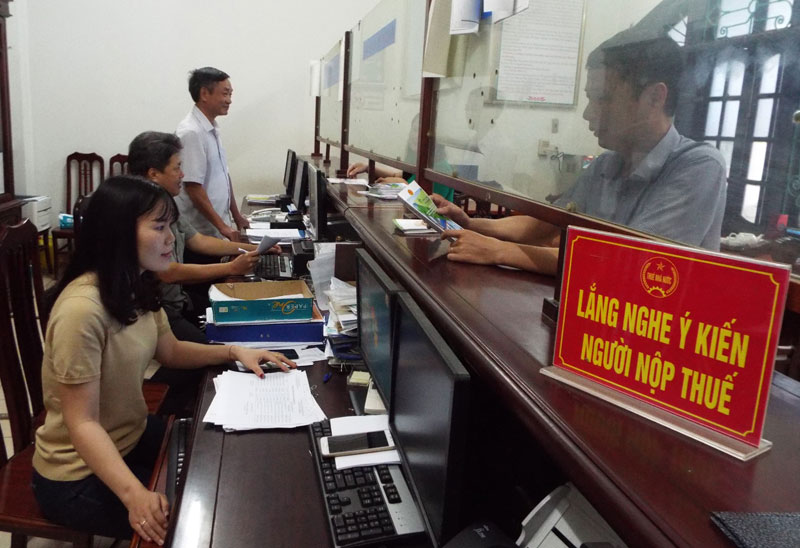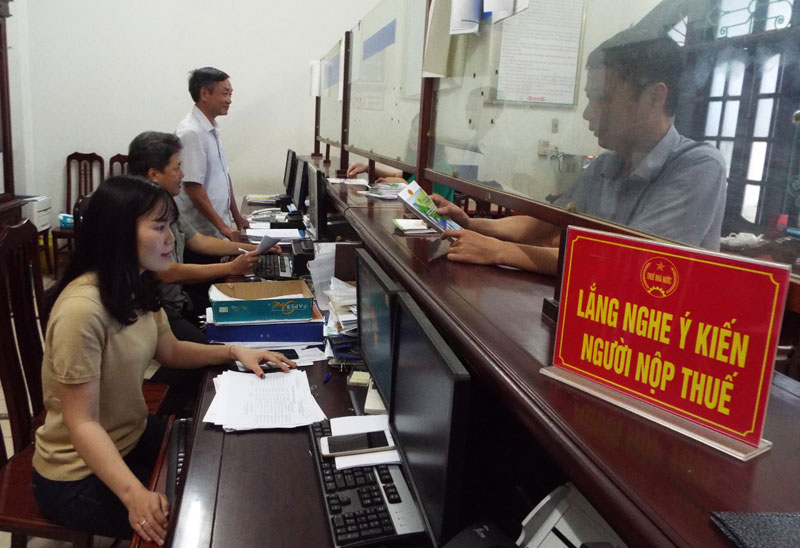
(HBO) – By July 31, 2017, total tax arrears in the northern mountainous province of Hoa Binh had stood at nearly 304.2 billion VND, of which more than 61.7 billion VND was overdue, down 5.7 billion VND as compared with the figure at the end of 2016. Of the total, bad debts accounted for over 111.3 billion VND, down 2 percent from the figure at the end of 2016) and recoverable debts were 193.9 billion VND, accounting for 7.4 percent of the estimates.
Hoa Binh city’s Taxation Sub-department well
reviews and manages income sources, creating favourable conditions for taxpayers
to fulfill their obligations to contribute to the State budget.
The provincial Department of Taxation has publicised a list of 38 businesses
which had owed more than 142.3 billion VND of tax by July 31, 2017.
In implementing the guidelines of the General Department of Taxation regarding
measures to collect tax debts in 2017, the provincial Department of Taxation
has instructed its city and district chapters and the debt management office to
base on the devised plan in order to instruct tax debt collection.
Drastic
measures will be taken to collect recoverable debts, striving to reduce both number
of debtors and debt amount by December 31, 2017, the department said, noting
that the debts should not exceed 5 percent of the State budget collection in
2017.
In July 2017, the provincial Department of Taxation made 1,106 phone calls and
sent 7,739 messages to businesses to inform them the amount of tax debts and
fines they have to pay.
The
department also held working sessions with nine businesses which failed to pay
tax but have financial difficulties. They were asked to commit to paying the
debts.
At
the same time, the department sent 242 documents to relevant credit
institutions and businesses in order to verify information and employ coercive
measures.
It issued 59 decisions asking for debt payments by taking money, blocking their
bank accounts, informing valueless invoices, coercing the third party and requesting
business licence withdrawal.
The names of businesses which still owed tax have also been publicised on the
sector’s websites and mass media.
To businesses which owed tax debts as they have yet to receive capital from the
State budget, the department will continue to review, instruct and issue nine
notices on allowing "no calculation of late payment” (in line with Clause 10, Article
2, Circular No. 26/2015/TT-BTC dated February 27, 2015, and Circular No.
06/2017/TT-BTC dated January 20, 2017 issued by the Ministry of Finance).
Along with measures to improve responsibility and capacity of tax officers, the
department is reviewing, classifying debts, synthesizing tax debts and
analysing reasons of each debtor./.
According to data from the Hoa Binh Provincial Party Committee, the industrial production index for the first six months of 2025 is estimated to have increased by 20% compared to the same period last year. This marks the highest year-on-year growth rate for this period since 2020.
In the first six months of 2025, Hoa Binh province’s export turnover was estimated at 1.145 billion USD, marking an 18.11% increase compared to the same period in 2024. Import turnover was estimated at $ 804 million, a 17.15% increase, which helped the province maintain a positive trade balance.
The lives of the ethnic minority farmers in Tan Lac district have gradually improved thanks to the new directions in agricultural production. This is a testament to the collective strength fostered through the professional associations and groups implemented by various levels of the district’s Farmers’ Union.
With the motto the "product quality comes first,” after nearly one year of establishment and operation, Muong village’s Clean Food Agricultural and Commercial Cooperative, located in Cau Hamlet, Hung Son Commune (Kim Boi district), has launched reputable, high-quality agricultural products to the market that are well-received by consumers. The products such as Muong village’s pork sausage, salt-cured chicken, and salt-cured pork hocks have gradually carved out a place in the market and they are on the path to obtaining the OCOP certification.
In the past, the phrase "bumper harvest, rock-bottom prices" was a familiar refrain for Vietnamese farmers engaged in fragmented, small-scale agriculture. But today, a new spirit is emerging across rural areas of Hoa Binh province - one of collaboration, organisation, and collective economic models that provide a stable foundation for production.
Maintaining growing area codes and packing facility codes in accordance with regulations is a mandatory requirement for agricultural products to be eligible for export. Recently, the Department of Agriculture and Environment of Hoa Binh province has intensified technical supervision of designated farming areas and packing facilities to safeguard the "green passport" that enables its products to access international markets.



